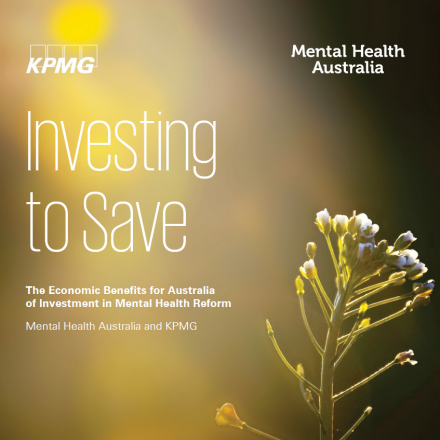Perspectives - February 2016

Welcome to the February 2016 edition of Perspectives, our online magazine where we present ideas, essays, and articles about what is happening in the mental health space.
In this edition’s feature article, Mental Health Australia CEO Frank Quinlan discusses the importance of ‘change management’ as reforms to the mental health system are implemented, and how governments must invest in this
We also have articles from our members, including a discussion about personal readiness to be involved in suicide prevention from Tracy McCown at Suicide Prevention Australia; a document outlining the role of Accredited Exercise Physiologists (AEPs) within mental health; a story about Ostara Australia, a national not-for-profit that provides specialist recruitment services for job seekers disadvantaged by mental illness; and a couple of fact sheets from Mental Health First Aid Australia about helping someone with mental illness and gambling, and mental illness and financial difficulties;
Other content from Mental Health Australia includes a brief on the Independent Hospital Pricing Authority Need Assessment Report; an update on becoming a Friend of Mental Health Australia, and a link to the Carers Guide and Checklist.
Don’t forget, we are always looking for input from our members. If you have a perspective about mental health that you’d like to share, we want to hear from you. Contact us via communications@mhaustralia.org
We’d also like you to engage with us. Do you have a comment on any of this month’s stories? Join the conversation on Twitter @ https://twitter.com/AUMentalHealth
Change Management as important as change itself
Feature Story By Frank Quinlan, CEO, Mental Health Australia
The move to digital television wasn’t as simple as just turning on the new signal and expecting everyone to be able to watch television – this modern reform required a dedicated process of change management by government, business and the community. The same can be said for mental health - change management must be as prioritized as much as the reforms themselves writes Mental Health Australia CEO Frank Quinlan.
IHPA Needs Assessment
By Mental Health Australia
We have been working with IHPA to engage the mental health sector in the development of the new Australian Mental Health Carer Classification. A key outcome of this work is a Needs Assessment which provides information on the capacity of CMOs to collect the data necessary to adopt the draft AMHCC Version 1.0
![]()
Calling for Friends of Mental Health Australia
By Mental Health Australia
We know you care about mental health, so do we. This year we have a once in a lifetime opportunity to change the trajectory of mental health. Support from everyday Australians will help us continue to make a big difference to the lives of people living with mental illness. So we are inviting you to become an individual member of Mental Health Australia
![]()
NDIS Guild and Checklist for Carers
By Mental Health Australia
Carers have a very important role in supporting potential participants of the NDIS. In partnership with Carers Australia we have developed a guide and checklist that provide information to help carers support the person they care for to engage with the NDIS effectively and to prepare for assessment and planning meetings.
![]()
From our Members
Thinking about your personal readiness to be involved in suicide prevention
By Tracy McCown, Suicide Prevention Australia
Most people now know that mental health problems are common and disabling. It is no different in the workplace, where the annual costs to the economy are often cited in be in the billions. Unfortunately, there may not be many people in a workplace who would know how to offer help to a co-worker who is developing depression, troublesome anxiety or a substance use disorder. Fortunately there are more programs becoming available to train employees in how to offer help a co-worker.
![]()
Youthful restaurateur supports employees with a mental illness to thrive at work
By David Sutherland, Ostara Australia
Ostara Australia is a national not-for-profit that provides specialist recruitment services to employers and finds sustainable employment for job seekers disadvantaged by mental illness or other disabilities. This article looks at how Ostara has worked with young restaurateur Ami Tran in Sunbury, Victoria, creating opportunities for workers with mental illness.
![]()
Helping someone with gambling problems
By Kathy Bond, Mental Health First Aid Australia
While gambling is an enjoyable recreational pursuit for many people, for some it can lead to significant harms. Mental Health First Aid Australia and Melbourne University used the Delphi expert consensus method to develop guidelines for how a concerned family member, friend or member of the public can recognise the signs of gambling problems and support a person to change their gambling.
![]()
Helping someone with mental health problems and financial difficulties
By Kathy Bond, Mental Health First Aid Australia
Mental health problems and financial difficulties can often go hand-in-hand, yet mental health professionals are not necessarily trained in how to assist their clients with financial difficulties. To aid this, Mental Health First Aid Australia has developed guidelines for mental health professionals to support clients with financial difficulties.
![]()
Consensus statement on the role of Accredited Exercise Physiologists in the treatment of mental disorders: A guide for mental health professionals
By Exercise and Sports Science Australia
Accredited Exercise Physiologists (AEPs) have experience and expertise in the assessment, design, and delivery of exercise and behaviour change interventions. With increasing opportunities for AEPs in mental health, it is essential that the broader mental health sector is aware of the types of interventions, modes of delivery, and likely benefits to service users associated with the utilisation of AEP interventions. This document defines the scope and capacity of AEPs in the mental health sector, raises awareness of AEP pathways available to mental health professionals, and describe the benefits of AEP interventions for individuals utilising mental health services.
![]()




